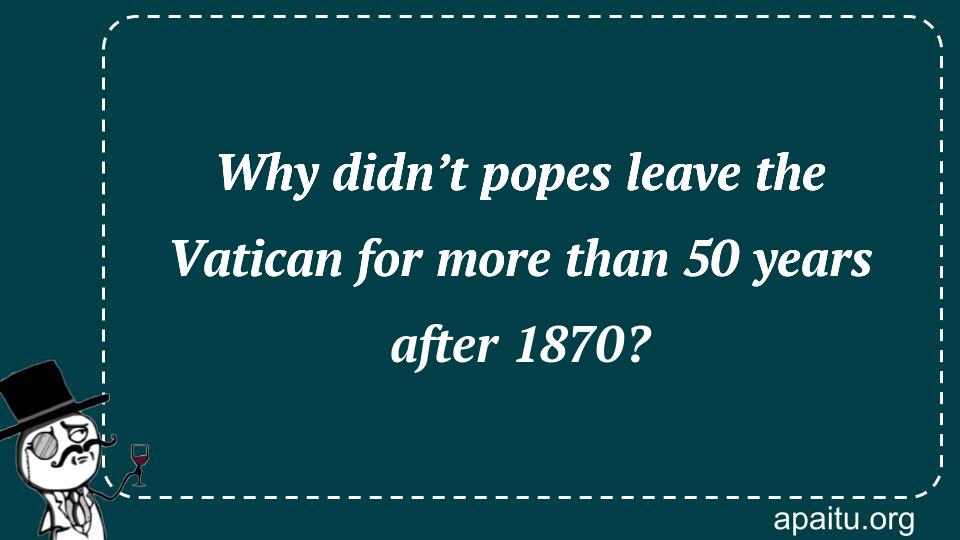Question
Here is the question : WHY DIDN’T POPES LEAVE THE VATICAN FOR MORE THAN 50 YEARS AFTER 1870?
Option
Here is the option for the question :
- Was a warrant for their arrest
- A territorial dispute with Italy
- They chose to be hermits
- The Swiss Guard went on strike
The Answer:
And, the answer for the the question is :
Explanation:
Pope Pius IX walled himself within the Vatican during the Italian reunification in 1870 and refused to leave out of protest because he thought it would be seen as endorsing the new secular authority in Italy. Until 1929, when the modern state of Vatican City was founded and formally separated from Italy, his successors carried on the protest.

The Vatican City State is the smallest independent state in the world, located in the heart of Rome, Italy. The Vatican is the spiritual and administrative center of the Roman Catholic Church and is home to the pope, who is considered the spiritual leader of the Catholic Church. However, for more than 50 years after 1870, popes did not leave the Vatican, due to a territorial dispute with Italy.
In 1870, Italy became a unified country, and as part of the process, it annexed the Papal States, which had been under the control of the Catholic Church for centuries. The Papal States included much of central Italy, including Rome and the Vatican. The annexation of the Papal States was a significant blow to the Catholic Church, which saw its temporal power greatly diminished.
The annexation of the Papal States led to a territorial dispute between Italy and the Catholic Church. The dispute centered on the status of the Vatican and its extraterritorial status. The Catholic Church argued that the Vatican should remain a sovereign state, independent of Italy, while Italy claimed that the Vatican was part of its territory.
The dispute between Italy and the Catholic Church was not resolved until 1929, when the two sides signed the Lateran Treaty. The treaty recognized the Vatican as a sovereign state, with its own government, laws, and diplomatic relations. The treaty also recognized the pope as the spiritual leader of the Catholic Church, and Italy agreed to pay compensation to the Catholic Church for the loss of the Papal States.
During the period of the territorial dispute, popes did not leave the Vatican, as they feared that if they did, they would be subject to Italian law and jurisdiction. This meant that popes were effectively confined to the Vatican for more than 50 years, and were unable to leave the city-state without fear of arrest or imprisonment.
The period of confinement had a significant impact on the Catholic Church and on the popes themselves. Popes during this period were effectively prisoners in their own home, unable to leave the Vatican and travel freely. This meant that they were unable to undertake pastoral visits or meet with other world leaders, which had a negative impact on the Church’s ability to engage with the world.
popes did not leave the Vatican for more than 50 years after 1870 due to a territorial dispute with Italy. The dispute centered on the status of the Vatican and its extraterritorial status. The dispute was not resolved until 1929, when the two sides signed the Lateran Treaty. During the period of the territorial dispute, popes were effectively confined to the Vatican, which had a significant impact on the Catholic Church and on the popes themselves. The period of confinement was a difficult time for the Catholic Church, and its impact is still felt today.